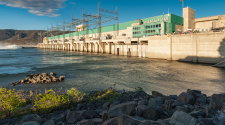New Zealand’s largest city is on the cusp of its longest-ever dry spell, as a total fire ban is declared for the entire North Island, home to millions of people.
According to the National Institute of Water and Atmospheric Research (Niwa), on Saturday, Auckland will mark 40 days of no rain – breaking the previous record from 2013, when no rain fell for 39 days.
A dry day is classified as one in which less than 1mm of rain falls, with records for the Auckland region dating back to 1943.
The conditions have brought water restrictions and drought to many parts of the North Island with animals such as the iconic Kiwi also feeling the strain.
According to Niwa regions in Far Northland are now in “severe drought”, with water tankers having to be brought in to replenish supplies.
Niwa meteorologist Ben Noll said some areas of the North Island would now require several heavy rain events – or a month of steady rain – to replenish parched lakes, rivers and soil.
“There remains at least some hope that some moisture could move toward the North Island between the 20th and the end of the month, but at least until then, rainfall chances appear few and far between,” Noll said.
“It would take several soaking rainfall events to alleviate the extremely dry conditions that are affecting parts of the country.”
NIWA Weather
(@NiwaWeather)When Auckland’s dry spell reaches 40 days on Saturday, it will become the longest on record 🏜️
The current record for the Greater Auckland area is 39 days, set in 2013. pic.twitter.com/rjpGLuaM2T
Associate Professor Cate Macinnis-Ng from the school of biological sciences at the University of Auckland said the drought would not only impact agriculture and farms, but forests and other ecosystems too.
“Around the world, there are growing records of forest dieback due to increasing frequencies and intensities of drought due to climate change,” Macinnis-Ng said.
“Established forests may be relatively safe from drought impacts, [but] seedlings and restoration plantings are vulnerable as developing root systems of smaller plants do not have access to deep soil water stores. If drought continues for extended periods, carbon uptake may be reduced as plant productivity slows.”
So far the New Zealand bushfire season has been relatively quiet, but fire and emergency services say “unprecedented” dry conditions in the North Island prompted them to issue a total fire ban this week.
Tim Mitchell, rural fire manager at Fire and Emergency New Zealand, described the current fire risk in the North Island as “extreme” and said it was unusual for regions such as Northland, Auckland and Waikato to experience such a long and extreme-risk fire season.
“There is a very real risk that in the current conditions a fire could easily spread and get out of control,” Mitchell said.
The warnings come just a week after 2,000 people were evacuated from Southland in the South Island, after days of torrential rains washed away roads, which resulted in the worst flooding the region in the South Island has seen in decades.
Meanwhile in western and southern parts of the South Island severe weather warnings have been issued for the weekend, as ex-Tropical Cyclone Uesi passes by.
MetService
(@MetService)Latest models show Uesi heading towards NZ. Although it won’t be Tropical Cyclone by then, severe weather is still expected, particularly for southern South Island, still recovering from recent storms. https://t.co/k44wyVOt1p ^RK pic.twitter.com/gOG8qjReLF















